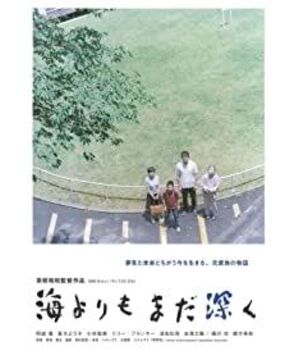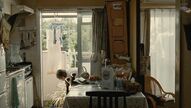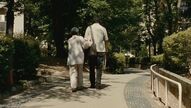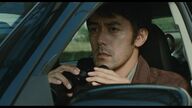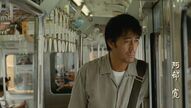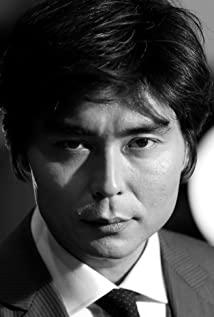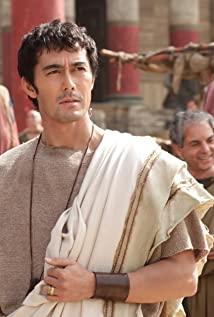In fact, I didn't know much about Hirokazu-eda. "Deeper Than the Sea" was the first film I watched by Hirokazu Koreeda. But it was three years ago that I read his "Never Stop" for the first time. To tell the truth, looking back three years later, the content of the book has been scattered in my memory, and only a yellow butterfly is still flying up and down. Yes, the butterfly again. But it's not the mysterious butterfly under Nabokov's magnifying glass, nor the one that Zhuang Zhou dreamed of being free and free.
In "Deeper Than the Sea", many mothers saw a butterfly at the intersection of a residential area when they were sending their sons away, and said that every time she passed this intersection, a butterfly would follow. Many joked about whether it was the blue butterfly born on the orange tree she raised, she said no, she thought it was the father of many. I think the butterflies in "Walking Nonstop" and "Deeper Than the Sea" are probably the embodiment of the love and memory of the living to the dead. The accidental death of the eldest son in "Step" has always shrouded the small family like a faint shadow, lingering; and the death of the father in "The Sea" also affects every family member more or less, especially is a lot of mothers. Although she said that she has never had a deeper love than the sea in her life, her feelings and memories of her husband are revealed everywhere in the film: she recalled her father's good writing with her daughter, and put away his shirt (a lot of complaining). Before she threw it away, she said that she only kept one, but she forgot that the quilt she helped her son make the night before was his father's quilt. However, when she told all this, her tone was so flat, and sometimes she even smiled, as if she was talking about a person who was still by her side, who was just on a long trip.
However, they are not there. Whether it is "Step" or "Sea", the butterfly is the embodiment of the deceased relative, the sweet self-deception of the living. Memories of the past are reborn, making absence and presence again.
In addition to the misunderstanding of butterflies, I was also deeply impressed by the misunderstanding of lottery tickets by many of my sons. After the typhoon, it was a mess. After Zhenwu came out of his grandmother's house, he ran to the grass and picked up a piece of waste paper, looked at it and then threw it away. He said indifferently, "I thought it was my lottery ticket." Zhenwu is a 100 % Good boy: He has a kind of filial piety and sensibleness that a bear child of his age does not have. He wanted to save money for his dad, so he picked a pair of sneakers that wasn't his favorite; he wanted to win the lottery because he could buy a big house and live with his mom, dad, and grandma; he didn't really like his mom's new boyfriend, but He remembered his mother saying, "You've grown up, you have to learn to pretend to be happy".
But he's just a kid after all. Just like on the night of the typhoon, he complained about his mother, why he said that he was still a child at one moment, and said that he had grown up at the same time. He mistook waste paper for lottery tickets, which implied doubts about all previous hopes. The so-called love and affection, those invisible and intangible emotional fetters, can really resist the cruelty of real life? In fact, by the end of the film, many plights still show no signs of getting better. Will he still insist on his idealism not to bow to reality and not accept the entertainment capitalization of serious literature and finally win the "Akutagawa Award"? Or go with the flow, write manuscripts for comics, and film extramarital affairs or help people find cats and dogs to make a living? Or do you still go your own way and bet on racing cars, play games and buy lottery tickets? The father-son relationship has always been unspeakable in the film. Although many fathers are absent, but from the memories of various parties, an image of "literary and artistic mixing" can be pieced together, and this is also inherited in many bones, although he "doesn't want to be like a father", When I was in high school, I wanted to be a "civil servant", but now I'm still on the old road. The scary thing is that when Zhenwu reads his composition aloud, his grandma praises him for his "literary talent" and "talent", but Zhenwu shows a kind of panic instead - at this time, "literary talent" seems to be a curse. He also doesn't want to be like his father, and now he is only a primary school student, and he says he wants to be a civil servant. They all seem to be idealists, but they are also terribly realistic. So, are they born idealists, fighting and walking in reality, or are they trying to escape because they are defeated in reality, so they build their own ideal world instead?
And the reality is that the spirit can be barren, but the body must never be hungry. Many mothers tried their best to hide money, but in the end they were trapped in this old house for 50 years, unable to realize their dream of living in a big house; many wives also left him because of his good gambling and "not being motivated". , because "the adult world can't just talk about love". And it was obvious that this money anxiety was passed on to the young Shingo as well.
So, for the cruel real life, those butterflies and lottery tickets, is it hope or an illusion?
Actually, you don't have to figure it out. After all, there is hope for the best money in life. If there is no money, you might as well have some illusions. All kinds of emotional fetters may be the best hallucinogen in life. No matter how bad the life is, as long as there is still a relative or lover, or the emotions and memories of being with him and sinking are still there, it seems that there are still sustenance and thoughts. It's like a return to Martin Buber's brilliant talk. If you are too obsessed with things and work hard, then you are living in the world of "I-it", which is not the real world; and only when I meet and relate to you, it is real and full of divinity. The "I-You" world.
"At this age, I haven't loved anyone deeper than the sea. But it is precisely because of this that we can live."
Although Dylan Thomas once wrote, "Don't go gentle into that good night," Hirokazu Kore-eda seems to console us that sometimes, perhaps, we need to go gentle and slow into that good night.
Good night.
View more about After the Storm reviews


